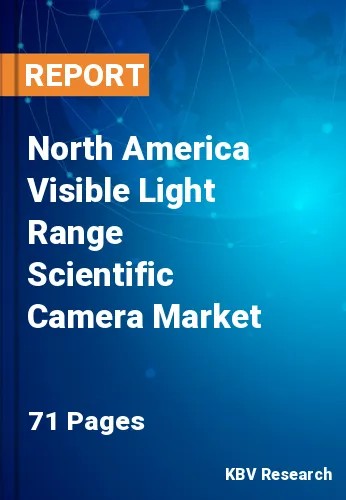The North America Visible Light Range Scientific Camera Market would witness market growth of 6.3% CAGR during the forecast period (2022-2028).
A visible camera sensor is an imager that captures visible light (400–700 nm) and transforms it into an electrical signal, then arranges that data to create pictures and video streams. Visible cameras use light with wavelengths between 400 to 700 nm, the same range as the human eye can see. Visible cameras capture red, green, and blue (RGB) wavelengths of light to produce pictures that accurately depict color. Modern security and surveillance cameras can recognize targets and objects in the picture in HD resolution or greater and with several lens options for broad angle or telephoto views.
A visible-light digital camera is often used to take pictures in visible light, but it is now also capable of measuring the photon energy of X-rays. The new feature is based on the fundamental operation of digital cameras. Charges are produced when a photon strikes a camera sensor chip's pixel photodiode. A digital camera cannot discriminate the photon energy or the color of visible light since one photon, in the case of visible light, can only create one charge.
Canadian space missions have improved science and technology for a very long time. Nine astronauts from the Canadian Space Agency have made 17 trips into space. Increasing Canada's space launch capabilities would benefit the country's space industry economically in urban and rural areas, promote innovation and research, assist national security, and give Canadians access to rewarding employment. The growth of space missions in the region to enhance the technologies and lives will increase the usage of the visible light range scientific camera for outer space missions, hence boosting the market growth in the region.
The US market dominated the North America Visible Light Range Scientific Camera Market by Country in 2021, and would continue to be a dominant market till 2028; thereby, achieving a market value of $179.9 million by 2028. The Canada market is poised to grow at a CAGR of 8.7% during (2022 - 2028). Additionally, The Mexico market would witness a CAGR of 7.7% during (2022 - 2028).
Based on Camera Resolution, the market is segmented into Less than 4 MP, 4 MP to 5 MP, 6 MP to 9 MP, and More than 9 MP. Based on Type, the market is segmented into sCMOS, sCMOS (Backthinned), CCD, CCD (Backthinned), and Others. Based on Camera Price, the market is segmented into Less than USD 15,000, USD 15,000 to USD 30,000, USD 31,000 to USD 50,000, and Others. Based on countries, the market is segmented into U.S., Mexico, Canada, and Rest of North America.
Free Valuable Insights: The Global Visible Light Range Scientific Camera Market is Predict to reach $612.3 Million by 2028, at a CAGR of 6.7%
The market research report covers the analysis of key stake holders of the market. Key companies profiled in the report include Hamamatsu Photonics K.K., Teledyne Technologies, Inc., Atik Cameras Limited (SDI Group plc), Oxford Instruments plc, XIMEA Group, Photonic Science and Engineering Limited (Tibidabo Scientific Industries), Diffraction Limited, Spectral Instruments, Inc, Excelitas Technologies Corp., and Thorlabs, Inc.
By Camera Resolution
By Type
By Camera Price
By Country
Our team of dedicated experts can provide you with attractive expansion opportunities for your business.

